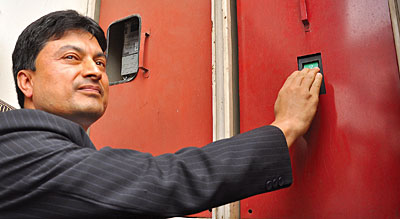 BIKRAM RAI |
In the transition from war to peace, from revolution to mainstream politics, our politicians seem to have forgotten that power no long comes out of the barrel of a gun. It comes out of the turbine at the end of a penstock pipe.
As the Jhalanath Khanal government prepares to step down as agreed in the five-point agreement, the best outcome now would be that his government will be replaced by a consensus cabinet of all main parties. This would offer a better chance to overcome the political hurdles that have deadlocked the peace process and governance for so long. We cannot afford another cliff-hanger at midnight on 31 August. The people need reason to hope that things will be different this time, and that can only come about if they see the parties seriously working together.
The Khanal government has come under a lot of criticism for sins of omission, and there are so many on our list that we've lost count. Many "sins of commission" were also committed with arbitrary, irrelevant decisions that wasted money and time. If it is true that the Maoist tourism minister unilaterally sanctioned the dangerously daft proposal to turn Lumbini into a Buddhist themepark, it needs to be investigated. The Finance Minister announced a distributive budget that pandered to patronage politics, was incoherent and could not prioritise.
But, it has to be said, there are bright spots. One of them is Energy Minister Gokarna Bista and the no nonsense style with which he has gone about tackling the country's crippling energy crisis. Bista represents a new breed of Nepali politicians who are motivated, professional, take advice from experts, prioritise and get down to work. (Pictured is Bista shutting off power this week to a government department that didn't pay its bills.) He is a do-er who wants results. And unlike party seniors who are always out to undercut rivals, Bista works across party lines with similarly committed young leaders within the NC and Maoists.
In this issue, we make a realistic assessment of the country's power crisis and come to the conclusion that winter power cuts will be debilitating for at least the next three years (p14-15). The reason is that successive governments after 2006 did not give the energy emergency the urgency it needed, or they played politics with it.
Bista is working from the recommendations of a preliminary White Paper issued by the Parliament Committee on Natural Resources of which the NC's Gagan Thapa is a member. For a document prepared by politicians, this is surprisingly cogent and solution-oriented. It points to a four-fold path to energy security including:
� Political consensus on future strategy
� Generate enough power to meet domestic demand for value-added industry and only then export
� Immediately commission a reservoir project in each development zone
� Unbundle transmission and distribution, address inefficiencies, corruption, pilferage in the NEA
Politicians and CA members get a lot of bad rap these days for not doing enough to get the peace process moving. But there are young turks in all political parties who are equally frustrated with this paralysing inertia, and should not be tarred with the same brush. They understand performance legitimacy and know that their constituents will judge them by their deeds, not words.
Nepal has a very dark future unless we, among other things, tackle the energy crisis. Which is why we must applaud politicians like Bista and Thapa, may their tribe increase.
Read also:
"Things will change"
Keep power politics out of power policy, SAROJ DAHAL
Power cuts here to stay into the 2020s unless corruption and politicisation are checked
Electric future, GAGAN THAPA
An end to power cuts is not just desirable, it is possible
See also:
Avoid a void, EDITORIAL


